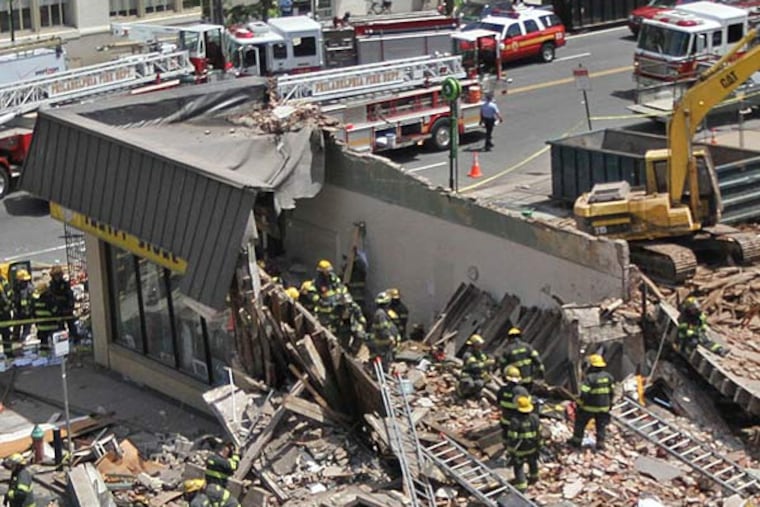Questions remain on 2-year anniversary of Center City collapse
On Friday morning, Mayor Nutter and the families of those killed or injured in the deadly collapse that flattened a Salvation Army thrift store will meet to mark the second anniversary of the disaster. There will be speeches, music, and a preview of the memorial park to be built at 22d and Market Streets, where six died and 14 were injured.

On Friday morning, Mayor Nutter and the families of those killed or injured in the deadly collapse that flattened a Salvation Army thrift store will meet to mark the second anniversary of the disaster. There will be speeches, music, and a preview of the memorial park to be built at 22d and Market Streets, where six died and 14 were injured.
"I just ask that people look back on this and remember," said lawyer Robert M. Mongeluzzi, who represents seven victims. "People should see the memorial and contribute. . . . There will be ample time for other things."
In Center City's criminal justice community, one of those other things will come next Friday, when a Philadelphia grand jury impaneled to investigate the collapse expires - and with it the likelihood anyone else will be criminally charged.
A grand jury's work is secret and prosecutors are usually barred from even confirming its existence, let alone disclosing who or what is being investigated.
The only reason the grand jury's existence is known is because District Attorney Seth Williams took the unusual step of announcing its formation and task just five days after the collapse on June 5, 2013.
The grand jury's original 12-month term was twice extended for six months, but it is now nearing its 24-month maximum under state law.
Thus far, two people have been criminally charged: Griffin Campbell, 51, the demolition contractor hired to take down buildings at 2136-38 Market St., and Sean Benschop, 43, operator of the 36,000-pound excavator whose work on an unsupported four-story brick wall is blamed for toppling it and crushing the adjacent Salvation Army store.
Each is charged with six counts of third-degree murder and 13 counts of reckless endangerment. If convicted of just two of the homicide counts, they would face mandatory life in prison without parole.
Plato Marinakos, the architect on the Market Street project, has been cooperating with prosecutors under a grant of immunity.
With just seven days until the grand jury expires, court observers wonder whether anyone else will be named, especially property owner Richard Basciano. The octogenarian is a veteran real estate investor and developer who owns most of the 2100 block of Market.
For much of that time, the block was considered one of the seediest in Center City. On it were a peep show, a porn theater, an adult gift store, and a hoagie shop.
But in early 2013, when Center City real estate values began increasing, Basciano announced plans to raze his properties and replace them with retail and apartments.
He did not, however, own the thrift store, and the Salvation Army refused to sell. Court filings documented a tense exchange of e-mails and letters between the parties over demolition safety that was unresolved when the collapse occurred.
In its November 2013 presentment recommending charges against Campbell and Benschop, a grand jury accused Campbell of cutting corners and ignoring danger signs to maximize the salvage value of the buildings' wooden floors and joists.
Campbell's attorney, William D. Hobson, has called his client a "scapegoat." Last year, he confirmed that Basciano was on the site talking with Campbell when the wall fell before their eyes.
Other documents, filed in connection with a massive consolidated lawsuit pending in Common Pleas Court, described Basciano as micromanaging every aspect of the demolition.
Basciano has not publicly commented on the disaster and his attorney, Thomas A. Sprague, has always declined to comment. On Thursday, Sprague again said he would have no comment.
Lawyers representing the Salvation Army and other organizations involved before and after the collapse said they had not heard of any others who would be charged.
"It really is amazing that they have been able to keep this secret, absolutely confidential, for this long," said Steven Wigrizer, who filed the first wrongful-death lawsuit on behalf of the family of Mary Lea Simpson, 24. "We have never had an indication that anyone else might be charged, and still don't. End of story."
"Maybe they just don't have enough," said one lawyer familiar with the case.
The legal standard for a criminal conviction is "beyond a reasonable doubt," a bar much higher than the "more likely than not" standard in a civil case.
Another lawyer noted that the U.S. Occupational Safety and Health Administration, in its November 2013 report on the collapse, blamed only Campbell and Benschop.
Williams hinted as much when he announced the charges against Campbell and Benschop. Even without further charges, he said, the grand jury may choose to issue a report "detailing its findings and may address policy implications."
That happened with the grand juries investigating child sex abuse by Roman Catholic priests and the illegal abortion mill run by West Philadelphia doctor Kermit Gosnell. In each case, the grand jury issued scathing reports detailing the organizational failings that enabled the criminal conduct to occur.
Meanwhile, prosecution and defense lawyers are preparing for the trial of Campbell and Benschop.
Common Pleas Court Judge Glenn B. Bronson has scheduled a pretrial hearing for July 24.
Jury selection is to begin Sept. 21 with testimony expected to start Sept. 28, although there could be delays caused by logistical problems from the World Meeting of Families.
215-854-2985@joeslobo